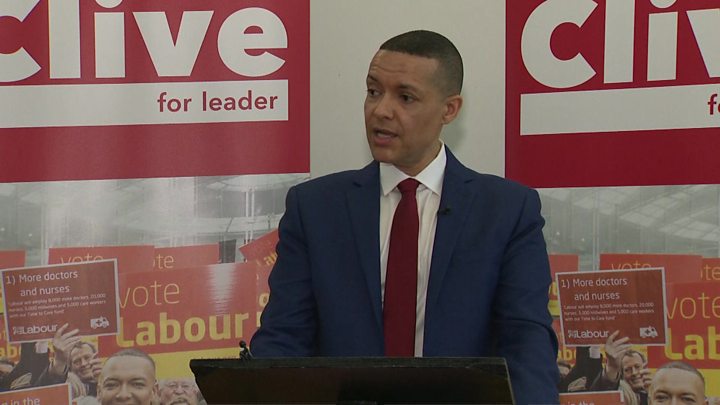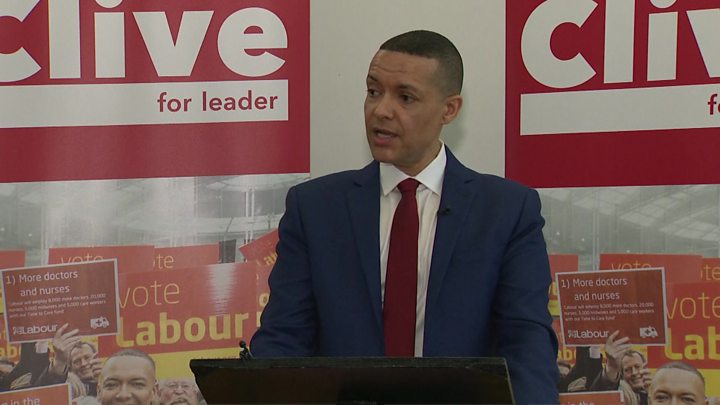Labour leadership: Clive Lewis calls for Royal Family referendum
Leadership candidate Clive Lewis says a lot of people would like to see the monarchy “scaled down”. …


Media playback is unsupported on your device
Labour leadership candidate Clive Lewis has said there should be a referendum on the future of the Royal Family.
Speaking at his campaign launch in London, he said: “A lot of people would like to see the monarchy scaled down.”
He said he understood the Duke and Duchess of Sussex’s decision to step back as “senior” Royal Family members.
Mr Lewis is running to replace Jeremy Corbyn as Labour leader but has not yet secured the support from MPs and MEPs needed to stay in the contest.
The shadow Treasury minister needs 22 MPs or MEPs to nominate him in order to stay in the race.
Asked about the Royal Family at his leadership campaign launch in Brixton, south London, Mr Lewis said he understood why Prince Harry and his wife Meghan wanted to step back from their duties.
“I think it is extremely unfortunate and a sign of the media we have that they feel they had to do this,” he said, arguing that Meghan had suffered from racism in the press.
He said a lot of people had discussed the Royal Family being “quite large” and asked: “Why not have a referendum on the future of the Royal Family?”
Mr Lewis added: “Let’s talk about what a modern state looks like and what the role of the Royal Family would be.”
“I’d rather see us as citizens than subjects in the 21st Century,” he said.
Are we citizens or subjects?
By Tom Edgington, BBC Reality Check
Historically, the term “subject” has often been associated with people belonging to a country under a monarchy.
Until 1949, nearly everyone with a close connection to the UK was called a “British subject”.
After that date, citizenship became the main form of nationality in the UK – replacing most people’s “British subject” status.
People in the Commonwealth – an association of countries formerly under British rule – continued to be collectively referred to as “British subjects” until 1983, according to the government (although it wasn’t an official status for most of them).
Nowadays, only a very small number of people qualify as British subjects, according to the government. For example, someone who is not recognised by any country as having a nationality may be allowed to become a British subject.
After his campaign launch, Mr Lewis took to social media to emphasise he was not calling for the monarchy’s abolition.
On Wednesday, Prince Harry and Meghan revealed their intention “to step back as ‘senior’ members of the Royal Family, and work to become financially independent”.
They said they would split their time between the UK and North America, while “continuing to honour our duty to the Queen, the Commonwealth, and our patronages”.
The decision came “after many months of reflection and internal discussions”, they added.
Justice Secretary Robert Buckland said that “we must continue to celebrate and support” the contribution the Royal Family makes to the UK, adding that it had an “important role in public service”.
So far, Mr Lewis has only secured support from four of his MP and MEP colleagues in his bid to become Labour leader, with Monday the deadline for gathering enough backing.
Also seeking more nominations is shadow foreign secretary Emily Thornberry who currently has seven.
The other candidates – Rebecca Long Bailey, Lisa Nandy, Jess Phillips and Sir Keir Starmer – have secured the required support.
There is also a contest to become deputy leader after Tom Watson stepped down in December.
The new leader and deputy leader will be announced on 4 April.
‘Alliance’
Addressing the future of his party, Mr Lewis said Labour needed to “modernise or die”.
He called for a “progressive alliance” with others and criticised his own party for failing to talk to the Greens and Liberal Democrats during the last election.
“Boris Johnson wasn’t afraid of talking to the Brexit Party and that worked extremely well for them – we didn’t do that,” he said.
He also criticised New Labour for “stepping away from our values in order to get into office” and said: “When we won victories in the 2000s we were planting the seeds of future losses.”




